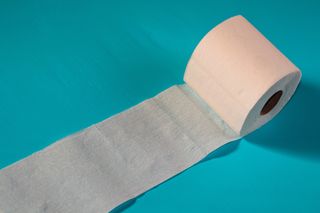Funny Ways to Day Your Pooping
What Happens If You Don't Poop for 40 Days?

A man in England is refusing to poop, allegedly to conceal evidence of drug dealing.
The police officers who arrested the 24-year-old on Jan. 17 said they saw him swallowing what appeared to be drugs. According to the BBC, prosecutors now say he's refusing to eat very much in order to prevent himself from pooping out the evidence. He's allegedly gone 43 days without evacuating his bowels.
So what happens when you refuse to poop? Not usually anything good, according to gastroenterologist Ian Lustbader of New York University Langone Health.
"Birds gotta fly, fish gotta swim and colons gotta poop," Lustbader told Live Science. [5 Things Your Poop Says About Your Health]
Fecal retention
Voluntarily withholding stool for long periods of time is rare, Lustbader said. Typically, people with chronic constipation or bowel-motility problems desperately want to defecate. (Bowel motility refers to how well the digestive system can move contents through it.) If they're eating and not pooping, the colon can become dangerously distended, a condition called "megacolon." The feces can become hard and impacted, and the bowel can actually rupture. According to the book "Management of Functional Gastrointestinal Disorders in Children: Biopsychosocial Concepts for Clinical Practice (opens in new tab)" (Springer, 2014), the colon can grow so large that it can extend up into the rib cage.
It's not clear what the world record for not pooping is, but the book on gastrointestinal disorders includes an abdominal X-ray of a 13-year-old with "functional fecal retention syndrome" who could not recall pooping in the past year. This syndrome, mostly seen in children, occurs when a patient becomes frightened of pooping, perhaps because past attempts have been painful. The patient tightens the pelvic muscles and buttocks when the urge to defecate strikes. Small amounts of liquid feces may sneak past the growing mass of solid stool, which becomes larger and more potentially painful to pass by the day. Kids can retain their feces for weeks or months. Symptoms include pain, irritability and loss of appetite. Treatment includes laxatives and stool softeners.
Colon slowdown
In the case of the man in England, refusing food would indeed dramatically delay the urge to defecate, Lustbader said, but that's a temporary solution: Eventually, malnutrition will become a problem. The best analogy is patients who can't swallow for neurological reasons, Lustbader said; they can survive on intravenous nutrition for a while, but intravenous feeding is hard to maintain over long periods.
If the man did swallow drugs, Lustbader said, he risks having the packaging they're wrapped in break down and having the drugs seep into his system. This could cause an overdose. On the other hand, Lustbader said, if the amount of drugs were small, the body could potentially absorb the seepage, and the man might successfully hide the evidence — unless the authorities test his urine. [What's in Urine? 3,000 Chemicals and Counting]
Holding back the urge to poop could also potentially damage the feedback mechanism that keeps the bowel moving smoothly, Lustbader said.
"If you constantly suppress the need to poop, you do run the risk of altered bowel motility in the future, or possibly needing laxatives or other things to stimulate your colon to work again," he said.
Even with no food whatsoever, he said, the bowel is likely to produce a little bit of runny discharge. The intestinal lining produces mucous and fluids, so the suspected drug dealer's colon is not likely to stay completely empty. The man is scheduled for his seventh court hearing on Friday (March 2), according to the BBC.
"We're going to see who wins," Lustbader said. "The system or the colon."
Original article on Live Science.
Source: https://www.livescience.com/61894-what-happens-if-you-dont-poop.html